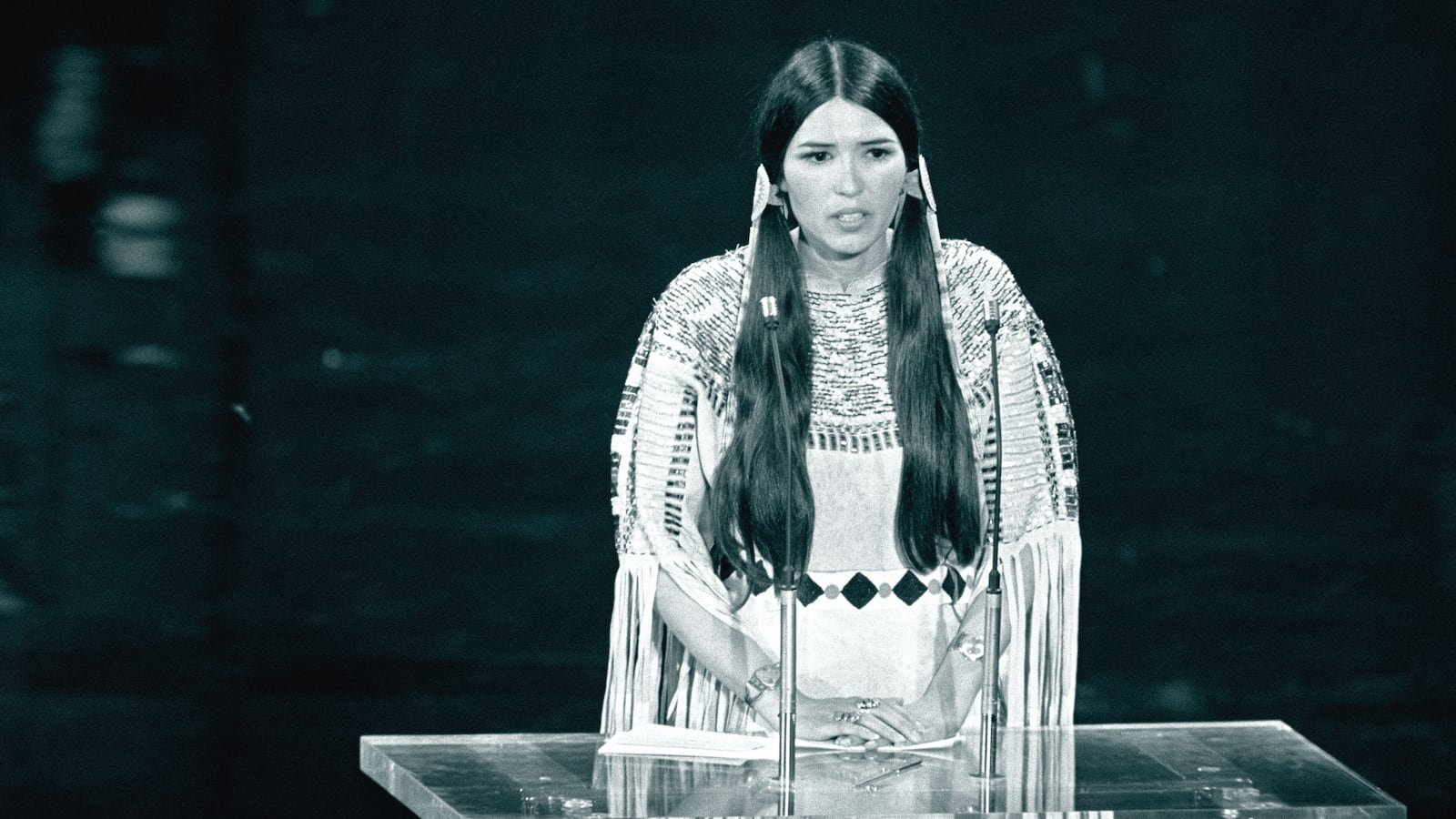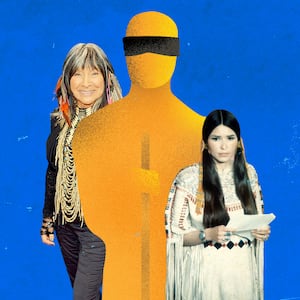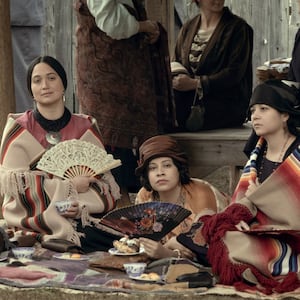Just days before the 96th Academy Awards, the family of activist Sacheen Littlefeather—born Marie Cruz—are being confronted with new claims that she was indeed the Indigenous woman she portrayed herself to be on stage during one of the most famous moments in Oscar history. And her two sisters tell The Daily Beast that the renewed inquiry has brought the trauma of their strained relationship back to the surface.
In 1973, Littlefeather got on stage to decline the Academy Award, on behalf of actor Marlon Brando, who had won Best Actor for The Godfather. Dressed in buckskins and presenting herself as a Native American, Littlefeather called out the industry’s misrepresentation of Native people and in that moment became known as a heroine for speaking up, and for her activism that followed.
Weeks after Littlefeather’s death in October 2022, Native journalist Jacqueline Keeler (Navajo, Yankton Sioux) published an investigative piece in the San Francisco Chronicle that deemed her an “ethnic fraud.” Citing family stories by Littlefeather’s sisters Rosalind Cruz and Trudy Orlandi, Keeler reported that Littlefeather was not part of the White Mountain Apache or Yaqui tribes that she claimed, but was instead of Mexican and European descent. The Academy stood behind Littlefeather, saying in a statement that they recognize “self-identification.”
Now, as Lily Gladstone (Blackfeet and Nez Perce descent) is poised to become the first Native American actor to win an Oscar for her role in Martin Scorsese’s Killers of the Flower Moon, the controversy is rearing its head once again.
Last week, The Hollywood Reporter contacted Keeler to present new claims that Littlefeather “had Indigenous ancestry after all.” Keeler forwarded the request for comment to sisters Cruz and Orlandi since there were family questions she could not address.
In an email viewed by The Daily Beast, THR’s senior editor of diversity and inclusion Rebecca Sun asked Cruz and Orlandi how well they knew their sister, how close they were to their paternal grandfather George, and whether he “or anyone on that side of the family ever [spoke] of being partially of Mexican Yaqui descent.” Sun, who previously broke the news about The Academy’s official apology to Littlefeather in 2022, then asked Cruz and Orlandi to provide DNA results from an Ancestry.com test they told her they had taken “because the genealogical records uncovered do pertain to [their] Mexican heritage.”
Responding directly to Sun, Cruz wrote, “As a family, the lengths we’ve seen ppl go to, to defend our sister without regard to the slander and emotional harm to our family's legacy and our father's good name is heartless. Let me be so brutally honest to say in this case I feel your [sic] the next journalist in line to twist facts by endorsing a myth at our emotional expense.”
Cruz told The Daily Beast, “We thought [Sun’s] questions were intrusive. We spoke the truth about our sister and this feels like a desperate attempt to rehabilitate her [image] at our family’s expense.”
In another email to Sun, Cruz asserted, “Our sister and Buffy Sainte Marie are made from the same mold,” referring to the famous singer-songwriter who was similarly accused of faking her Native heritage. “Pretendians.” She added that her Ancestry.com info would remain “private within our family.”
“We were approached by a former colleague of Littlefeather’s last fall with genealogical claims that had not yet been made public,” Sun said in a statement to The Daily Beast on Tuesday. “The questions I submitted were part of standard journalistic due diligence asking for clarity on what had been shared with me during the course of my reporting, including assertions that the sisters declared to me directly. We are confident that our story presents the new claims with proper context, which in this case necessarily includes the perspective of Littlefeather’s surviving family.”
Sun told Keeler and Littlefeather’s sisters that the claims stem from a baptism certificate from 1819 that suggested that the sisters’ great-great-great grandfather was Indigenous. That record, shared with me by Keeler and shown below, confirms the baptism of the sisters’ great-great-great grandfather, Juan Antonio Gonzales Seam, on Yaqui land in present-day Mexico.

Keeler told Sun that the record in question “describes [Seam] as being born on Yaqui land with the Spanish words ‘criollo de la tierra,’ and the location ‘de yaqui,’” going on to explain that “the historian we consulted pointed out that criollos de la tierra refers to migrants from somewhere else.” She contrasted that with the baptism record below of a Native child who was Apache. In this case, the location is not “de Apache” and the child is described as “Apache hijo,” or “Apache son.” Citing the historian, Keeler wondered why Littlefeather’s ancestor’s baptism was missing the words “yacqui hijo.”

There are other interpretations of the record in question. Prof. Brian Haley of State University of New York at Oneonta told The Daily Beast that while it could indicate that Littlefeather had a Yaqui ancestor, he stressed further confirmation is needed since errors do occur in parish records. He wrote to me via email that “one record alone is not enough to confirm Native ancestry, and that there is no evidence of a Yaqui community claiming any family members as their own in this or subsequent records.”
Richard Manriquez, a distant cousin of Rosalind Cruz and Trudy Orlandi, spent four years researching genealogical records of his family’s history. He told me, “I have traced our (Manriquez) family lines back to Europe in the 1500s and found not a single person who identified as being Native American or Indigenous in Mexico.” This included research into the Cruz family line.
The THR reporter’s request for the sister’s DNA tests raises deeper questions about whether having an Indigenous ancestor in the distant past necessarily makes one Indigenous. Dr. Kim Tallbear, a leading expert on the links between genetic science and the ideas of race and Indigeneity, told me that such DNA tests “do not point to particular ancestors or Indigenous nations to which they belonged. This is because so-called Native American markers are shared by hundreds or thousands of Indigenous nations across the American continents.”
“Indigeneity in Mexico is similar to the U.S.: you have to be part of a community,” Rick Saenz (Comanche Nation), a researcher on Indigenismo in Mexico, wrote to me in an email. “This is even more so because there is no enrollment in Mexico [unlike in the U.S. where Native Americans must be officially recognized as citizens of tribal nations].” He added that if Littlefeather was Indigenous from Mexico, “she would have said it in her interviews,” and she “would have named her Pueblo (Indigenous community and town they reside in) in Mexico.”
Yaqui people in the United States also stress the importance of community. Joe Candillo, a citizen of the Pascua Yaqui Tribe, wrote to me by email this week, “No one person has the right to proclaim themselves Yaqui without going through the formal recognition process set forth by the Pascua Yaqui Tribe of Arizona and further being accepted formally as a tribal citizen.”
Keeler pointed out that Littlefeather described herself as White Mountain Apache as she became known as a Native American activist. Claims of being Yacqui emerged decades later, in the 1990s.
Trudy Orlandi recalled a conversation with her sister Littlefeather as she considered adding Yaqui heritage. “When she was confronted about her claim [of being White Mountain Apache], she became concerned about being outed as a fraud,” Orlandi said. “I suppose she incorporated the Yaqui heritage since it was harder to prove she wasn’t.”
Helene Hagan, who was close friends with Littlefeather for more than 30 years, also questioned her claims with the Yaqui people after a visit with Littlefeather to the Pascua Yaqui Tribe reservation in 1992. “As far as I know, Sacheen had never been on that reservation before,” Hagan told me. “She did not seem to be particularly interested, intellectually or spiritually, in the foundation myth of the Pascua Yaqui Tribe.” Hagan added that the Yaqui women at the event questioned her behavior from the start, and it was “only after that visit that she began to mention she was Yaqui.”
Cruz recalls confronting her sister about her supposed Native American identity shortly after her appearance at the 1973 Oscars. “And throughout our lives, I told her on several occasions that I didn't want to dress up as an Indian and go to powwows as her sidekick,” she told me by email this week. But it wasn’t until after Littlefeather’s death in 2022 that her two sisters learned the extent of what they have asserted are lies about their collective heritage and upbringing.
In a letter to The Academy Museum sent in January 2023 Orlandi wrote, “After Marie died, I learned that she said we lived in a poor Indian neighborhood in a shack with no toilet, etc. Nothing could be further from the truth.” Orlandi described growing up in a middle-class family in a mostly white neighborhood, saying she had “hard-working parents who owned their own saddle shop business.”
Particularly, they found Littlefeather’s description of their father, Manuel Cruz, as an abusive alcoholic deeply offensive. Orlandi wrote in her January 2023 letter to The Academy Museum that it was their paternal grandfather, George Cruz, who was an alcoholic while characterizing their father as a victim who never drank or smoked. “George’s alcoholism and angry temperament landed him in jail more than once and caused my father to be displaced from his home at a young age,” she explained.
In that same letter, Cruz said her father lost his hearing to meningitis at age nine and struggled with sickness as he worked to support his family.
Manuel died of lung cancer in 1966 when he was 44 years old. “Both Rosalind and I, along with our mother, were with my father when he passed in the hospital,” Orlandi wrote to the Academy. “Sacheen was not there. It was a difficult time.”
Both sisters said in their letter that Littlefeather hated their father and was “ashamed of her Mexican American/Spanish heritage.” Orlandi added that Littlefeather changed who she was, saying that “Marie’s transformation during her late teens/early twenties into being an exotic American Indian Princess, which included a name change and rejecting her Mexican heritage, was more appealing to her identity.”
Littlefeather’s sisters believe that her Native identity stemmed from mental health challenges she faced throughout her life. In her January 2023 letter to The Academy Museum, Orlandi noted that Littlefeather spent a year at Agnews State Hospital from July 1969 (when she claimed to have been at Alcatraz), and then “it was one mental hospital after another.”
Orlandi wrote that her sister wanted to be different and famous from a young age, ultimately settling upon calling herself Sacheen Littlefeather. “She perfected her identity by becoming immersed into this character,” Orlandi added. “I saw the change over time until she became absorbed into this persona even though we have no such identity in our family history.” Cruz also emailed the THR reporter a scanned copy of the July 1969 admission letter to Agnews State Hospital.

The Hollywood Reporter’s pending exposé, which sources indicate would be published on Wednesday of this week ahead of the Oscars, comes 17 months after Keeler’s investigation found no ties to the Nations that Littlefeather claimed—and just days before Gladstone could take the stage at the Academy Awards.
Cedar Sherbert, a filmmaker and citizen of the Iipay Nation of Santa Ysabel, sees a clear connection. He even went so far as to suggest in an email to me this week—without evidence—that the larger Hollywood establishment is behind the efforts to dredge up the controversy surrounding Littlefeather’s heritage.
“This feels like a choreographed effort by the Academy to save its investment, to save face,” Sherbert said, alluding to both the Academy’s apology to Littlefeather and the decision to prominently include her in a 2023 exhibit on “Indigenous Voices.” He noted that the film industry has a long history of misrepresenting Native peoples and profiting from films that make them look subhuman.
“But what the industry does have is Sacheen,” he added. “And in rehabilitating her, it’s attempting to rehab its own dismal track record with Natives.”
Rebecca Sun told The Daily Beast directly on Tuesday that she had not “communicated with anybody at The Academy” about her story and stressed that it has been in the works for several months. “These claims did not originate from anyone affiliated with the Academy, which has had no involvement in this story.” she said, adding, “I don’t even know if they know that this is happening.”
The Daily Beast reached out to spokespeople for both The Academy of Motion Picture Arts and Sciences and The Academy Museum of Motion Pictures and both declined to comment.
But whatever their origin, resurrecting claims of Littlefeather’s Indigeneity is taking its toll on her sisters. Cruz told me this week that the attempt to rehabilitate Littlefeather both abuses her father’s memory and victimizes him yet again. “Say what you want about me, but my father did his best for his family,” Cruz added. “My parents were wonderful people and gave us a wonderful life.”
Cruz said she was “shaking” as she realized she and her sister would “have to go through this all over again, fighting off strangers who want to ruin our family’s reputation and our father’s good name for personal gain.”








